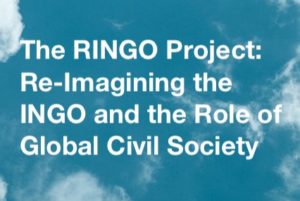Many this week will be mourning the death of Queen Elizabeth II. As I write this in London, there is now a 4.9 mile-long queue starting from the Palace of Westminster of people wanting to file past and pay their respects before her funeral on Monday 19th. The genuine sadness felt across the country is palpable on every corner.
But for others this is also a complicated world event for whom it is difficult to separate the death of a dedicated monarch with the colonial past that the British Royal family represents. Now, with the succession of her eldest son, Charles III, we can expect to see new calls from former and present-day British colonies for Britain to make amends by paying reparations, issuing apologies, returning stolen artifacts, or, like Barbados did in 2021, becoming a republic and rejecting the Queen as its head of state.
Significantly for RINGO, this history is not only tied up with the egregiousness and wrongs of state-led colonialism, it is intimately tied up with the role of International NGOs (INGOs). Some were set up to effectively repair the damage that colonialism wrought (like unfair trade practices and exploitation, or conflict); whilst others, some argue, are continuing the exploitative mission of colonialism long after the independence of former colonies. You can see vestiges of this across most INGO sectors, from environment to peacebuilding to humanitarianism.
What we’ve learned in RINGO is that even those INGOs with good intentions (eg. repair and restoration) continue to face barriers to shifting power. They have the advantage of resource and influence, underpinned by an elite western ruling class, so well-enshrined in the British monarchy. It’s not uncommon, for example, to see Royal ‘patrons’ of INGOs, on its own a strong signifier of power and influence. Her Majesty the Queen, for one, was patron of Save the Children for decades.
I’m sure as King Charles takes the reins, he’ll continue to face the hangover of Britain’s colonial past and hopefully be part of the movement towards a more equitable world. In the meantime, through RINGO and others, the international civil society sector can take our cue and respond to the multiple calls to decolonize and shift power. It won’t happen overnight and we’re only beginning this journey in earnest. But I believe we’re finally ready to not only acknowledge the past, but also take the hard decisions needed in order to move much further beyond the remains of this legacy. Importantly, we should do so with compassion and generosity, not as a defensive, rear-guard action to protect our positions of power.
Some of these decisions may lead to the closing of INGOs entirely; others will lead to a complete reshaping of what an INGO looks like, how the institution is funded and governed, and how we relate to the people with whom we work with and on behalf of.
We can’t absolve or change the fact that colonialism happened. But our important work in RINGO and through the wider #shiftthepower community can go some way to ensuring we stand in solidarity with those at the receiving end of colonialism’s damaging legacy and seek to undo our own replication of this unjust model.
Photo by Samuel Regan-Asante on Unsplash

